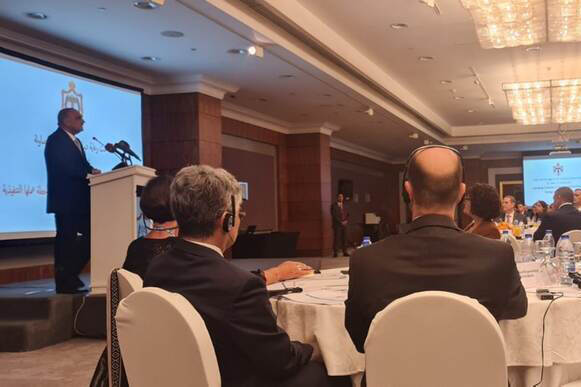Jordan: Food Security Regional Hub
Disruption of the global food system by Covid-19 and the war in Ukraine has spurred Jordan into action. Jordan wants to be a regional hub for food security: storage, logistics and applied agricultural knowledge and know-how. This offers opportunities for Netherlands experts, organizations and companies to engage in knowledge exchange and benefit from Jordan’s role as a hub in a challenged region.
National Food Security Strategy (NFSS) 2021-2030 and its executive action plan 2022-2024 were launched on Monday the 29th of August 2022, during a ceremony patronized by the Jordanian Prime Minister H.E. Dr. Bishr Khasawneh.

The strategy was drawn up under the directives of His Majesty King Abdullah II to designate 2021 as the year of food security and turn Jordan into a food security regional hub. Based on the efforts, the Kingdom's food security measures have moved it up from 62 in 2020 to 49 in 2021 on the Global Food Security Index.
Ongoing crises, such as refugee waves, coronavirus pandemic, climate change, and the Russian-Ukrainian war, are the reason for the launch of the strategy, indicating that these crises have made countries vulnerable to food insecurity and exacerbated their economic, social, and environmental challenges.
In addition to the aforementioned reasons, the NFSS and its action plan were needed to:
- Support realization of the role of Jordan as a strategic regional hub for food security that will serve as a center for storage and logistics, agricultural production, food processing, irrigation systems, plastic greenhouses, technology and knowledge transfer and as a hub to provide emergency assistance to the countries of the region.
- Coordinate efforts and interventions among institutions working in the field of food security.
- Monitor and foster progress towards achieving relevant S.D.G. targets.
- Build resilience to climate change and its impacts.
- Mitigate the impact of COVD19 on food security.
- Address the consequences of the Syrian refugee crisis as a protracted crisis on food security in Jordan.
Underlining the need for a comprehensive strategy that addresses all pillars of food security; the Ministry of Agriculture, who has led the process, indicated that this endeavour requires the engagement of multiple government institutions and their relevant developmental counterparts. Therefore, a broad-based and participatory approach has been adopted for the NFSS and its action development process, including close coordination and consultations with the relevant stakeholders. The Netherlands Embassy in Jordan was the only international development partner to be invited to be part of the food security strategy development in 2020; along with UN agencies (ESCWA, FAO, UNDP, WFP). The Dutch embassy was a member of the review committee for the strategy.
The strategic objectives are:
- Ensure availability of food at national, household & individual levels
- Enhance access to food.
- Optimise the utilisation & stability of food.
- Strengthen the governance of food security.
Emphasising the importance of the strategy, and due to the increasing global interest in the issue of food security in its main dimensions (availability, access/access, use and stability), especially as a result of the spread of the Corona pandemic, there was an urgent need to identify a governmental body that will supervise and follow up on issues and topics related to food security. Consequently, Jordan institutionalized food security through establishing a Higher Council for Food Security and Agriculture under the Prime Ministry, and the chairmanship of the Prime Minister. This council will be responsible to implement the strategy and its action plan.
Furthermore, in October 2021 the embassy of the Netherlands in Amman has endorsed Jordan to be supported on food systems transition; accordingly, Jordan was selected as one of the 5 countries to be supported within the FaST programme (Foresight and Scenarios for Food Systems Transformation); funded by the Netherlands and implemented by IFAD, Oxford and Wageningen University and Research. FaST will enable food systems foresight and scenario work, and support a global foresight brokering function to assist uptake and learning across a wider network of countries.
The embassy will work on connecting the implementation of Jordan’s policies and ambitions with Dutch projects for innovation and knowledge exchange.
Here and through the links below you can download and read the final National Food Security Strategy (2021-2030) and its action plan (2022-2024).